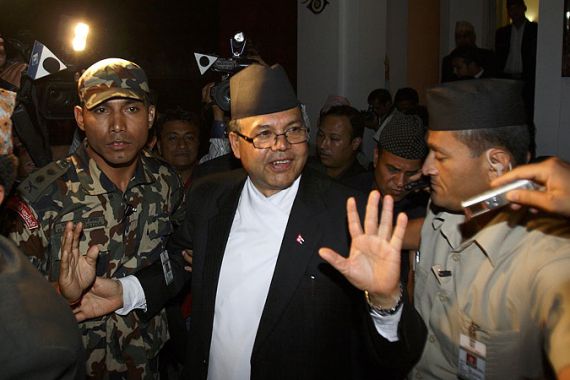Nepal’s prime minister resigns
Jhalanath Khanal, who headed fragile coalition government, steps down amid pressure from the opposition.

 |
| The Nepalese PM leaves after submitting his resignation to President Ram Baran Yadav in Kathmandu [Reuters] |
Jhalanath Khanal, Nepal’s prime minister, has submitted his resignation to the president over failure to reach consensus on moving forward with the country’s peace process.
Khanal stepped down on Sunday, sending the country’s political parties scrambling to form a new coalition government and draft a new constitution.
“I have resigned to pave the way for a national consensus government,” Khanal told reporters after tendering his resignation to President Ram Baran Yadav.
“The major tasks of accomplishing the peace process and writing the new constitution have not progressed as desired,” his office elaborated further in a statement.
“Therefore, the prime minister stepped down with an objective to pave the way for forming a national consensus government and expedite the statute drafting and peace process.”
Khanal was elected six months ago with a vow to carry out promises made in a 2006 peace deal with the country’s former Moist rebels.
But political in-fighting blocked his attempts to help thousands of former Maoist fighters living in camps, and to prepare Nepal’s first republican constitution after the monarchy was abolished in 2008.
“He tried to forge a consensus until the last minute. But the parties failed to agree on constitution-drafting and the peace process, so he has resigned,” Surya Thapa, a government press adviser, said.
‘Lacking credibility’
Anurag Acharya, a journalist with the English language Nepali Times newspaper, told Al Jazeera the resignation was expected because Khanal’s Unified Marxist Leninist [UML] party was not the largest in parliament.
“Its candidate, Jhalanath Khanal, became PM only after two other parties [UCPN (Maoist) and Nepali Congress] could not agree to put up their own candidates,” Acharya said.
“It [UML] also lacked credibility owing to its number third position in the 601-member parliament.”
The resignation follows comments from Maoist leader Baburam Bhattarai, who said in an interview published on ekantipur.com that Khanal should resign.
“Prime Minister Jhalanath Khanal would have to resign as part of the five-point deal regardless of any progress in the peace process,” Bhattarai said.
Journalist Acharya told Al Jazeera: “I don’t think Maoists might have put pressure on Khanal, he resigned due to the internal politics of UML.”
Threat of deadlock
The Himalayan nation was without a prime minister for seven months until Khanal, chairman of the UML party, took office in February. A parliamentary deadlock could return following his departure.
Khanal, 60, headed a fragile coalition government of three parties, including the Maoists, but he had said he would resign unless a deal was reached to advance the peace process.
Integrating about 19,000 former Maoist rebel fighters into the army is one of the key sticking points in the peace process, with military leaders and the opposition Nepali Congress party resisting the move.
Bhattarai as next PM?
“I think the next leadership will be headed by Maoists as they have unanimously chosen Bhattarai as their candidate for PM,” Acharya said.
“A consensus government headed by Maoists and supported both by the Nepali Congress and Madhesi bloc is the best bet for Nepal,” he said, referring to the country’s southern regional party.
“All political parties need to join hands to get cracking to clear the hurdles on the path to the peace process.”
Nepal’s constituent assembly, formed after the 2006 revolution, got a three-month extension in May after a last-minute deal between main political parties under which Khanal was to step down.
A new constitution is needed to pave the way for fresh elections but the constituent assembly has failed to draft the document despite two deadline extensions.
The next deadline for the constituent assembly expires on August 31, and with Nepal once again amid political instability, it will likely get yet another extension.
The Maoists, who fought government forces between 1996 and 2006, are the biggest party in parliament after winning 2008 elections under Pushpa Kamal Dahal, known by his nom de guerre, Prachanda (“the fierce one”).
In 2008 the parliament voted to abolish Nepal’s 240-year-old Hindu monarchy, transforming the country into a secular republic.